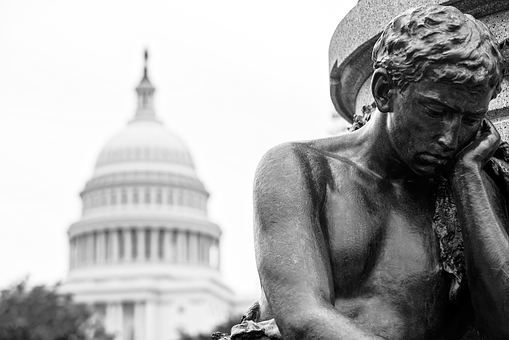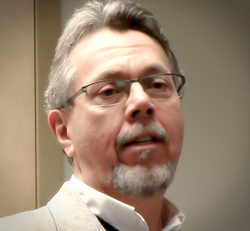"Forever more there will be only love, and mercy within mercy within mercy." The term, “Crossing the Rubicon” is a metaphor for a point in time when a decision is made from which there is no turning back. If we are old enough, then we have likely reached that critical juncture at some time or another in our lives.
The decision to get married is not, in my opinion a Rubicon decision. Certainly, getting married is a significant event in one’s life, but people get divorced and the consequences aren’t so dire if there are no children involved in the relationship. On the other hand, the decision of whether to have children is a threshold crossing choice; one from which there is no way back. Once you become a parent, you will always be a parent regardless of how active or inactive you are in the lives of your children. In the same vein, the decision to terminate a pregnancy is absolutely a Rubicon decision for obvious reasons. If one is gay, the decision to publicly acknowledge your sexual orientation to others is another “no turning back” type of decision. In my way of thinking, honesty and trustworthiness is a choice that has significant and permanent consequences if crossed. I see trust in the same way as being pregnant: there is no in-between. Just as a woman is or isn’t pregnant, a person is or isn’t trustworthy. I try to be open minded and open hearted about these things, but if someone lies to me, or tries to cheat me or I see them taking advantage of others, I can never fully trust that person again. They have crossed the Rubicon of trust. Now, I won’t shun them or speak ill of them. I will just try to never put myself in a position where my wellbeing relies on having to trust what they do or say. And if they are a leader of some type, I certainly won’t follow them. As I was thinking about all the nuances of this idea, a phrase popped into my head and it is this: God will never cross the Rubicon against you. God will never reach a point of no return where he turns his back and forever walks away. This thought is driven home by one of my favorite images of God from the Catholic monk and prolific author, Thomas Merton in this passage from his book, The Sign of Jonas: “What was vile has become precious. What is now precious was never vile. I have always known the vile as precious: for what is vile I know not at all. What was cruel has become merciful. What is now merciful was never cruel. I have always overshadowed Jonas with my mercy, and cruelty I know not at all. Have you had sight of Me, Jonas, My child? Mercy within mercy within mercy. I have forgiven the universe without end, because I have never known sin….” One must sit with this image for a while. Whenever I read this Merton passage, I am awestruck by its implications, conveying such a tender and yet powerful image of God. “I have forgiven the universe without end because I have never known sin.” God forgives us even when we are vile, even when we are cruel, even when we are unmerciful. Whatever the sin, God sees us as precious. In some ways, I guess you could say that God does cross the Rubicon for us. He crosses the Rubicon of forgiveness. He forgives us and there is no turning back. Forever more there will be only love, and mercy within mercy within mercy.
0 Comments
"Let your love be the strength of your resistance." I have friends who are conflicted by the times in which we are living. These are peaceful, even spiritual people who are dismayed at the policies being advanced at the state and federal level, but who also strive to see the good in everyone; even those who are lying to the public and pushing a divisive agenda. These friends are trying to “love” their way through. They are praying for guidance on how to remain true to their values and how to love their “enemies” even though they refuse to use the term enemy. They feel their values are challenging them to show love for politicians whose actions are anathema to their own sense of justice.
I struggled with this same conundrum early in my organizing career. When I worked in Providence Rhode Island, I came up against a famously corrupt mayor named “Buddy” Cianci. I had a small block club on Bogman street and all they wanted was to get their garbage picked up regularly and the rat problem to be abated. I knew there was a rat problem the first day I rode my bike down Bogman street because there was a squished rat in the middle of the road. The garbage wasn’t getting picked up and after a series of unsuccessful meetings with uncooperative bureaucrats, the block club leaders decided to take bags of garbage to the mayor’s office. When we arrived, the mayor was ready. The block club was led by an earnest fellow named Reverend Jolly who worked in a factory to make a living but who served as a pastor of a tiny congregation on nights and weekends. We were ushered into the mayor’s office and before we were even seated the mayor began yelling, “Who is Reverend Jolly?” The Reverend raised his hand and immediately Cianci strode over to him and began punching Jolly’s chest with his index finger yelling, “Reverend. Reverend. You’re no f***ing reverend. You work in a f***ing FACTORY.” I started to speak up to defend my block club leader and then Cianci turned on me. “Who the f*** are you?” he bellowed. When I told him I was the organizer for the block club, he blew up. “You’re f***ing nobody. Get the f*** out of here.” He turned to his security and told them “get him the f*** out of here.” At that point, Reverend Jolly spoke up and said “I want him to stay.” Which somehow cut the tension and the mayor calmed down. I guess he figured he made his point. He was in charge. After leaving the mayor’s office I was livid. I couldn’t believe the mayor had done a background check on Rev. Jolly and was trying to humiliate him. I was in my mid-twenties. This was my first paid organizing job and I was on fire with a sense of justice. I wanted to “do something” to get back at Cianci. I was trying to rally the reverend to go to the press and complain about how he was treated. But that day, Rev. Jolly taught me a lesson that has stayed with me. He said to me, “Mike, I don’t see it that way. I see Cianci as a man in pain. I’m not interested in going after him. I’m interested in helping my family and my neighbors get our garbage picked up. I’m focused on the ‘love thy neighbor’ part of the bible, not on the ‘eye for an eye’ part.” Rev. Jolly wasn’t organizing his fellow residents out of anger at Cianci, he was organizing out of a sense of love for his family and his neighbors. And because of his strong capacity to love, he was not about to back down or be intimidated by the mayor’s theatrics. That’s the lesson I’d like to impart to my friends who don't know how to respond to today's politics in a way consistent with their values. Focus on the love of neighbor and not on the anger at the politicians. Focus on your love for the 24 million people who will be without health care if the Republican health care plan is adopted. Focus on your love for the elderly adults who will go hungry without meals on wheels to support them. Focus on your love for city teens who will be turned away from the afterschool programs and released to fend for themselves on the streets. Focus on your love for the countless unemployed who want to work but will be turned away from job training programs. Focus on your love, not on your anger. Let your love be the strength of your resistance. "In the worst of times, we can become the best of our selves." As I was thinking about this article, the opening line to the Charles Dickins novel A Tale of Two Cities came to mind. While written in 1859, these words amazingly reflect the mood of the country today.
“It was the best of times, it was the worst of times, it was the age of wisdom, it was the age of foolishness, it was the epoch of belief, it was the epoch of incredulity, it was the season of Light, it was the season of Darkness, it was the spring of hope, it was the winter of despair, we had everything before us, we had nothing before us…” Certainly, if you are an immigrant or a Muslim living in America, these are not good times. So too if you are elderly or low income and relying on Medicaid or the Affordable Care Act for your health insurance these times are worrisome. The same can be said if you care about clean air or clean water or climate change. But we must also recognize that for some, these are good times. The stock market has hit an all-time high. Tax cuts for the wealthy seem to be around the corner and government regulations on all types of businesses are being rolled back. Some economists tell us that we are nearly at full employment. Depending on where you sit in society, these are truly the best of times or the worst of times. I understand that history presses down on some people harder than others, but how we respond to each situation is dependent on our point of view. We choose whether to be hopeful or woeful in response to our circumstances. Howard Zinn, activists, professor and bestselling author (whose books may be banned in Arkansas) wrote: “To be hopeful in bad times is not just foolishly romantic. It is based on the fact that human history is a history not only of cruelty, but also of compassion, sacrifice, courage, and kindness.…The future is an infinite succession of presents, and to live now as we think human beings should live, in defiance of all that is bad around us, is itself a marvelous victory.” This idea of remaining positive in bad times may seem a bit Pollyannaish, but do we really have a choice? I think we have seen the answer already. Yes, people are in fear of being deported, but there is a growing Sanctuary movement and scores of volunteers are walking arm in arm with potential deportees so they don’t have to go through this process alone. When the Muslim ban was announced, thousands of people appeared at airports across the nation to stand in solidarity with those being singled out. Politicians are denouncing credible news outlets as an “enemy of the people” and the response has been a flourish of new subscribers to these very same outlets. Systems Theory guru Peter Senge advises that one should look for unintended consequences when considering a course of action. The unintended consequence of the recent actions by the Republican controlled federal government is an awakening of activism, the level of which has not been seen in a least a generation. This renewed activism is of itself a “marvelous victory” which should be celebrated . So, the answer to how one remains hopeful in bad times is this: · Focus on what you can do and do it. · Whatever you do, do it in community with others · Celebrate the small victories Bad times come and go. What remains is how we will remember our own actions during these times of turmoil. Did we stand up or did we cower? Did we organize others or did we wring our hands in despair? In the worst of times, we can become the best of our selves. "We use contracts to manage the messiness of living. We use covenant to let our loved ones know we bless the mess" Do we build our relationship with others based on contracts or on covenants? Henri Nouwen, author, priest and spiritual director wrote that contracts are transactional. You do something for me and I will do something for you. For example, at the beginning of winter, I agree to pay my neighbor and he shovels my walk each time it snows. Or, we tell our children that if they do well in school, we will extend their curfew. Those are contracts. Once we use this filter to view our interactions, we will see that there is a remarkable amount of contractual relationships that we negotiate daily.
Covenants, on the other hand are a one-sided promise. I promise to do something for you regardless of what you may or may not do for me. There is no quid pro quo. These are much more difficult to see; especially if we are looking for them in our day-day encounters. Certainly, marriage vows are a covenant, as is the unconditional love we express for our children and our loved ones. What is interesting though, is that while we “covenant” our love, we work it out on a day to day basis through a multitude of stated and unstated contractual arrangements. How a couple divides up the household chores is a contract. If one partner works full time and the other works part time in order to be with the children, that is a contract. Telling your kids that they can play multiple sports in school, but they must also help with the chores around the house is a contract. When I first started thinking about these concepts, the idea of covenant seemed like a no-brainer. Of course, I have a covenant with my children I thought. I promise to love them no matter what. I vow to be there for them when they need me. I stand with open arms and a loving heart when they leave and return home. But I must confess that I don’t always live up to those standards. For example, I began to feel as if the relationship with one of my adult children was all one-sided; that I initiated all the contact. I eventually got to the point where I told my child that I was done reaching out. If there was to be a relationship with me, they would need to initiate it. Essentially, I shifted from a relationship that I thought was a covenant to one that was contractual: I will no longer reach out to you until you begin reaching out to me. Predictably – in hindsight – this ended up with a long and painful silent period. I’m happy to say that things are slowly working out, but I know it will take a while before everything is back to where they were before. My point is: Covenant is difficult, but not impossible. We use contracts to manage the messiness of living. We use covenant to let our loved ones know that we bless the mess. We know that all of us will fail, all of us will falter, all of us will not live up to stated and unstated expectations. But what the covenant ensures is that our failings are not the measure of our relationship. The measure of our relationship is how easily we look over the mess and how deeply we express our love. You are my beloved. And I know that I am yours. That is the covenant. |
AuthorMichael Soika has been a community activist for more than 30 years working on issues of social and economic justice. His work for justice is anchored by his spiritual formation first as a Catholic and now as a Quaker. Archives
June 2018
Categories |





 RSS Feed
RSS Feed